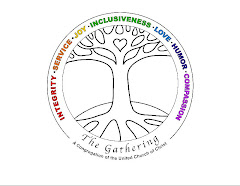
San Angelo Mayor J.W. Lown resigned to help his male partner, a citizen of Mexico living in the U.S. without documentation, enter America legally. Lown is now on the outside looking in, as the picture symbolizes. J.W. wears the blue shirt. He works from Mexico on behalf of his partner.
This act prompted much reflection and many conversations about both marriage equality and US immigration laws. As an Open & Affirming congregation, The Gathering encourages such discussion. Friend and colleague Lou Kavar is living with the complexity of these issues, and I asked him his thoughts. They follow.
The Difficult Choice
The Rev. Louis F. Kavar, Ph.D.
I knew other couples who faced the difficult choice. While I had a great deal of empathy with them, I also wondered why they hadn’t thought about the problems they’d face from the beginning. I thought that I was smarter than getting myself into this kind of situation. Was I ever wrong!
It was early in 2003 when we began to correspond. We got to know each other, our interests and our dreams. I wasn’t sure where it would lead. While we seemed to get along, I was cautious because we were from different cultures. Yet it seemed as though we had known each other a long time. It wasn’t that wild, crazy kind of love portrayed in the movies. It was more like putting on a comfortable, familiar piece of clothing: it fit just the way it should and felt right.
He’s from
I have traveled to several countries in the past. While I wasn’t sure that I could adapt to life in Hong Kong, I thought I’d do just fine living in
Believing I had considered all the possible problems, I allowed myself to commit to my partner. We’ve lived together as a couple for six years. I can’t imagine my life without him. In many ways, he’s brought the best out of me.
Two years ago, our lives changed. My mother, who previously insisted that she would always remain in the home of my youth, suffered an unexpected stroke. She lost her eye sight and could not live alone. Her long term care insurance was inadequate to provide the care she needed .She feared the possibility of a nursing home. With no other option, my partner and I agreed that she could live with us.
My life has changed a great deal. I have given up pastoring and traditional ministry in order to work at home online as a university professor. I’m my mother’s primary care-giver. My partner has completed his graduate degree and is frantically searching for a job to support a visa to stay in the
My partner has been active in my mother’s care. They’ve grown to love and depend on each other. Mom enjoys when he makes certain Chinese specialties for her, like congi – a rice porridge – and home-made egg rolls or dumplings. (Because of her salt free diet, her food often needs to be made separately.)
My partner and I agree: she would not adapt to a nursing home. While many people do well with institutional life, Mom just wouldn’t be one of them.
While my partner and I would have no difficulty living in another country if he doesn’t find a job to support a work visa in the
On June 3, the Senate judiciary committee convened hearings on a bill known as the United American Families Act. This bill would recognize couples like mine to utilize the existing immigration process used by heterosexually married couples. This bill has been introduced in both the Senate and House’s judiciary committee every year since 2001 and this is the first time hearings have occurred. It’s clearly progress. But no one expects the bill to get out of the committee this year. The best one couple hopes for is that next year it would be part of a larger immigration bill. But even then, such a provision would be in conflict with the Federal Defense of Marriage Act which proscribes that the Federal government and all of its agencies must define marriage as one man and one woman. It’s going to be a long road to change.
So what about me and my family? We’ve discussed the possibility that my partner could live in
Or he could pursue another degree – one that he doesn’t want. But we already have student loans for his graduate school. How much more in debt do we need to go just to maintain our family?
The problem isn’t a new one. It’s faced by gay and lesbian couples around the country. It’s not that we want special treatment, just equal treatment. Perhaps one day immigration laws will change and gay couples will also have the legal ability to marry. But it won’t happen soon enough in the
The Rev. Louis F. Kavar, Ph.D. is an ordained minister in the


This comment has been removed by the author.
ReplyDeleteJ.W. was tempted by a soul sucking life inside the D.C. beltway. He chose personal authenticity. J.W. came back from the ethical wilderness with his soul intact. Satan is still out there, tempting others with the allure of unbridled power and ridiculous sums of money.
ReplyDelete